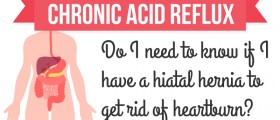
Hiatus hernia is prolapse of the upper part of the stomach into the chest cavity. Increased abdominal pressure together with weakness of diaphragm leads to the condition. The problem with symptoms that are common for hiatus hernia is that they are similar to majority of symptoms of some other diseases. Pain in chest shortness of breath are only two symptoms of the disease but they are as well present in heart attack or pulmonary embolism. Sometimes hiatal hernia does not feature with any symptoms at all. The pain is mainly connected to gastric acid which regurgitates from stomach into the esophagus.
There are several types of hernia: sliding, fixed and complicated hiatal hernia. Unlike the first type, fixed and complicated hernias present with obvious symptoms and may lead to serious complications. Complications include chronic heartburn or the inflammation of esophagus due to regurgitation of stomach acid, anemia caused by prolonged hemorrhage from the lower part of esophagus, esophageal strictures and scarring, chronic cough and potential pneumonias due to regurgitation of stomach acid into the respiratory tract.
The diagnosis of hiatal hernia is easily set after barium X ray examination of upper gastrointestinal tract. More invasive methods include gastroscopy and upper intestinal endoscopy.
Fortunately the condition is curable. In the beginning the treatment focuses on changes in dietary regimes. Certain foods are forbidden. They include chocolate, fat foods and everything that leads to hyperacidity such as coffee, alcohol and smoking. One should eat more frequently but portions must be rather small. The food is forbidden three hours prior the bedtime. If person is obese he or she should lose weight. One should avoid positions that improve entrance of the stomach acid into the esophagus such as bending position and so. Even belts are not allowed. While sleeping one can use high cushions and pillows to elevate the head above the rest of the body. This way acid cannot move back to the esophagus.
If previously mentioned does not work one can be prescribed certain medications. Antispasmodics can be given as well as calcium channel blockers. Basically the drugs that are prescribed are either used to reduce the acidity or to increase the strength of esophageal muscles.
The combination of diet and medications is most effective in treatment of hiatal hernia. However in case of complicated hiatal hernia one may be surgically treated. The surgical procedure includes bringing back the stomach into the abdominal cavity. The diaphragm is then strengthened to prevent further acid reflux and heartburn.

















Your thoughts on this
Loading...